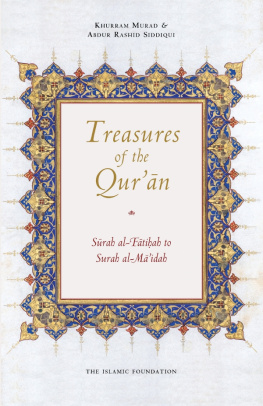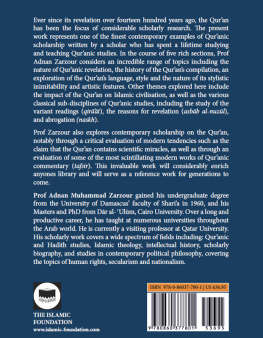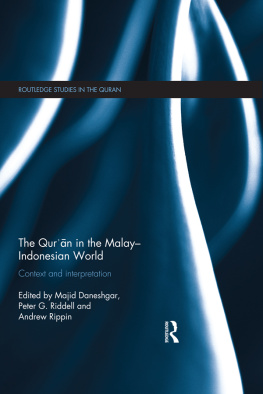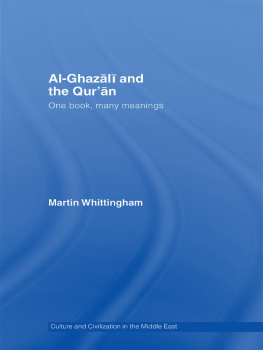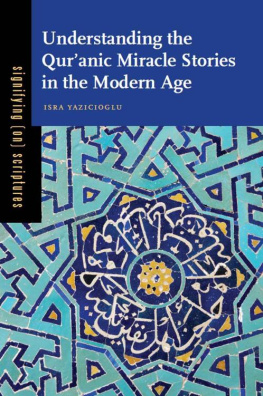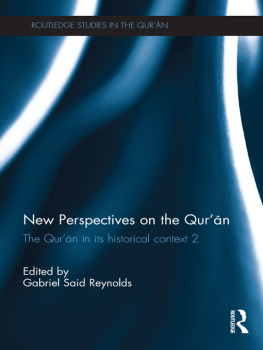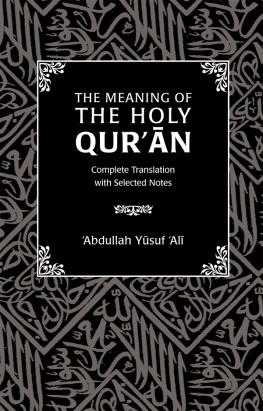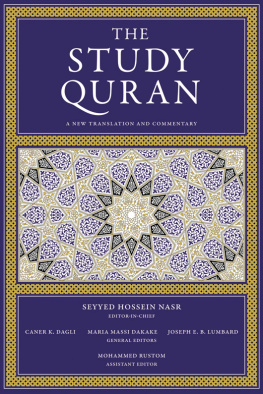THE QURAN
TEXT AND COMMENTARY
THE QURAN
TEXT AND COMMENTARY
VOLUME 1
EARLY MECCAN SURAS POETIC PROPHECY
ANGELIKA NEUWIRTH
Translated from the German by Samuel Wilder
Yale UNIVERSITY PRESS
New Haven and London
The translation of this work was funded by Geisteswissenschaften InternationalTranslation Funding for Work in the Humanities and Social Sciences from Germany, a joint initiative of the Fritz Thyssen Foundation, the German Federal Foreign Office, the collecting society VG WORT and the Brsenverein des Deutschen Buchhandels (German Publishers & Booksellers Association).
Copyright 2022 by Yale University.
Originally published in German as Der Koran, Band 1: Frhmekkanische Suren, Poetische Prophetie Verlag der Weltreligionen im Insel Verlag Berlin 2011. All rights reserved.
This book may not be reproduced, in whole or in part, including illustrations, in any form (beyond that copying permitted by Sections 107 and 108 of the U.S. Copyright Law and except by reviewers for the public press), without written permission from the publishers.
Yale University Press books may be purchased in quantity for educational, business, or promotional use. For information, please e-mail (U.S. office) or sales@yaleup. co.uk (U.K. office).
Set in Granjon LT Std 11/13 type by Newgen North America.
Printed in the United States of America.
Library of Congress Control Number: 2021948027
ISBN 978-0-300-23233-2 (hardcover: alk. paper)
A catalogue record for this book is available from the British Library.
This paper meets the requirements of ANSI/NISO Z39.48-1992 (Permanence of Paper).
10 9 8 7 6 5 4 3 2 1
CONTENTS
ABBREVIATIONS
| BEQ | Heinrich Speyer, Die biblischen Erzhlungen im Qoran, Grfenhainichen 1931 [1935] |
| BSOAS | Bulletin of the School of Oriental and African Studies |
| EQ | Jane McAuliffe (Hg.), Encyclopaedia of the Qurn, 6 Bde., Leiden 20012007 |
| EI1 | Enzyklopaedie des Islm. Geographisches, ethnographisches und biographisches Wrterbuch der muhammedanischen Vlker, 4 Bde., Leiden und Leipzig 19131936; diverse Supplemente zwischen 19341938 |
| EI2 | Encyclopedia of Islam, 2. Auflage, diverse Herausgeber, 11 Bde., Leiden 19752002; Ergnzungsband 2004 |
| FVQ | Arthur Jeffery, The Foreign Vocabulary in the Qurn, Baroda 1938 |
| GdQ1 | Theodor Nldeke, Geschichte des Qorns, Gttingen 1860 |
| GdQ2 | Theodor Nldeke, Friedrich Schwally (editor), Geschichte des Qorans von Theodor Nldeke. Completely reworked by F. S., Part I: ber den Ursprung des Qorans, Leipzig 1909 (printed Hildesheim 1961); Part II: Die Sammlung des Qorans, mit einem literaturhistorischen Anhang ber die muhammedanischen Quellen und die neuere christliche Forschung, Leipzig 1919 (printed Hildesheim 1961); Gotthelf Bergstrsser, Geschichte des Qorans, Teil III: Die Geschichte des Qorantexts, Leipzig 1938 (printed Hildesheim 1961). |
| GVGS | Carl Brockelmann, Grundriss der vergleichenden Grammatik der semitischen Sprachen, 2 Bde., Berlin and New York 19081913 (Nachdruck Hildesheim 1961) |
| HThR | Harvard Theological Review |
| HUCA | Hebrew Union College Annual |
| IOS | Israel Oriental Studies |
| JAL | Journal of Arabic Literature |
| JAOS | Journal of the American Oriental Society |
| JbTh | Jahrbuch fr Biblische Theologie |
| JESHO | Journal of the Economic and Social History of the Orient |
| JQS | Journal of Qur anic Studies |
| JSAI | Jerusalem Studies in Arabic and Islam |
| KKK | Rudi Paret, Der Koran, Kommentar und Konkordanz, Stuttgart 1971 |
| KU | Josef Horovitz, Koranische Untersuchungen, Berlin 1926 |
| K | Rudi Paret, Der Koran, Stuttgart 1966, 92004 |
| MIDEO | Mlanges de lInstitut Dominicain dtudes Orientales du Caire |
| MIO | Mitteilungen des Instituts fr Orientforschung |
| OLZ | Orientalistische Literaturzeitung |
| QLA | Angelika Neuwirth, The Quran and Late Antiquity: A Shared Heritage, Oxford 2019 |
| SEAP | Albert Arazi, Salman Masalha, Six Early Arab Poets. New Edition and Concordance, Jerusalem 1999 |
| SKMS | Angelika Neuwirth, Studien zur Komposition der Mekkanischen Suren, Berlin and New York 1981, 22007 |
| WKAS | Wrterbuch der Klassischen Arabischen Sprache, Volume I (1957). |
| ZDMG | Zeitschrift der Deutschen Morgenlndischen Gesellschaft |
INTRODUCTION
POETIC PROPHECY
The first volume of the hand commentary, which is presented here, attempts to present the Quran for the first time as the transcript of a proclamation. Unlike the commentaries presently available, it detaches the Quran text as rigorously as possible from the Islamic tradition, and thus also from the sequence of events in the life of the prophet, in order to make the text recognizable as the mirror of a communication process that remained open-ended until its close. The hand commentary thus assumes a perspective essentially different from that of the Islamic exegetical tradition, which reflects a later stage of development. The exegetical tradition understands the victory of the new religious movementnot only over the established political powers of the environment, but also over the theological positions of the older religious traditionsas the necessary result of the prophetic proclamation, and thus views itself as justified in reading the Quran teleologically on the way toward this victory. With our assumption of an initially open-ended process of emergence, the Quran loses this thrust that has been traditionally assigned to it; in its place enters a historical view toward the text, which now requires a chronological reconstruction. For this reason, the traditional ordering of the suras within the textual corpus cannot be binding for the hand commentary: it thus does not begin with the first sura of the Quran. For what is relevant here is not the canonical text corpus that is now materially available, and which was established in the first Islamic century, but rather a virtual corpus, the sequence of the texts spoken out by the prophet Muhammad. This sequencewhich is suggested by form- and genre-critical investigationwould have begun with the consolation and praise suras Q 93 (al-u), 94 (al-shar), 97 (al-qadr), and 108 (al-kawthar); these texts therefore form the beginning of our commentary. The commentary covers in essence the suras of the first Meccan period as delimited by Theodor Nldeke, but rather at best they resemble sequences of development. An approximately precise chronological ordering of the suras does seem to usand this is a decided novelty of this commentaryto be thoroughly reconstructable if one takes the orality of the Quran seriously, and thus proceeds from the assumption, not of literary unities that reflect the changing style of an author, but rather of the respective new stages of a proclamation that each in turn unfolds further that which has already been communicated. One must take the stylistic criteria foregrounded by Nldeke and combine them with discursive criteria, in order to detect in the individual suras the traces of the respective new developmental stages of the ideas already presented. With this approach, a transition becomes evident from texts that are wholly concentrated on the proclaimer to texts that are directed collectively, which gradually come to articulate moral critique, then gradually develop an interest in eschatology that is bound up with creation theology. This development culminates finally in texts that employ the new self-authorization of the message by scripturewhich is first pervasive in the middle of the early Meccan periodto depict the shift of the proclaimers group of dependents from an ascetic-missionary movement to a community of believers standing in the monotheistic scriptural tradition. The new sequencing of this hand commentary thus attempts to strengthen the thesis that the individual suras develop from one another; value is therefore placed on a continuous referencing back to earlier suras, where ideas are taken up and developed further in an individual text. Occasionally also, where a thought figure is under discussion, attention is given to its full, later unfolding in later texts. A testing of the developments of individual themes that we assume here, undertaken with the help of the concordance and following the sequence of suras deployed in the hand commentary in order to check for possible reversibility or other convincing alternatives, has also provided a (negative) confirmation of the viability of this sequence.


